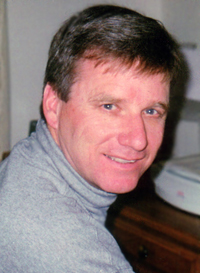 |
Pete Earley |
A newspaper reporter for 14 years, including seven years at The Washington Post, Earley has spent the past 22 years writing a dozen books, including three national best-sellers. One of these books – “Crazy: A Father’s Search through America’s Mental Health Madness” – detailed the mental health problems of Earley’s son, Michael, and the inadequacies of the U.S. mental health system.
The book was a one of two finalists for the 2007 Pulitzer Prize and won awards from the National Alliance on Mental Illness, Mental Health America, the Washington Psychiatric Association and the American Psychiatric Association.
This week, Earley came to Omaha as one of the presenters at a workshop on Wednesday titled, “Mental Health and Criminal Justice: A Community Collaboration.” The workshop was held at the new Harper Center on the Creighton University campus and was sponsored by the UNMC Department of Psychiatry, the UNMC College of Medicine Dean’s Office, the UNMC Center for Continuing Education and the Creighton University Center for Health Policy and Ethics.
The workshop’s purpose was to bring together behavioral health and criminal justice system personnel to discuss the impact of the lack of mental health services on the Omaha community, its businesses, and its citizens as well as to identify an agenda for improvement.
On Tuesday evening, Earley spoke at a dinner at the Omaha Hilton to a group of community leaders in the mental health and criminal justice fields, including a number of city, county and state officials.
He told the compelling story of his son’s ongoing battle with mental illness and how his family has struggled to get Michael the care he needs.
While driving from New York to Virginia, Michael told his dad that he hadn’t slept in five days and that he wanted to kill himself. He had stopped taking his medications for his bipolar disorder because “all pills are poison.”
When they arrived back in Virginia, Earley tried to get his son hospitalized. However, Virginia has a statute that only allows people with mental disorders to be hospitalized when they pose an imminent danger to themselves or others.
He had to lie and tell hospital officials that his son had threatened to kill him. He had to violate his media ethics by using his connections at The Washington Post and his friendship with Mike Wallace of “60 Minutes” to get his son admitted.
“You shouldn’t require a person with a brain disorder to get arrested before they can get the services that they need,” Earley said. “That is wrong.” He said that jails and prisons have become the new asylums.
Because many mental health patients are homeless and uninsured, the number of hospital beds set aside for mental health patients is quite limited. “Psychiatric beds are not profitable,” Earley said, noting that in many instances, hospitals would much rather opt for “profitable surgical beds.”
“We need to turn mental illness into a health problem – not a criminal problem,” Earley said.
Omaha is no exception, said Don Kleine, Douglas County attorney. “The interconnection between the mental health system and the criminal justice system is inseparable,” he said. “Both are at capacity. We’re trying hard to help keep people with mental health issues out of the criminal justice system.”
The lack of financial resources for mental health care must be addressed, said Earley, who acknowledged that Nebraska should be applauded for its efforts to reform mental health care and for actively looking for improvement and solutions.
More money must be directed toward mental health, he said. This would allow people to be screened earlier for mental problems and enter interventional programs sooner.
|
|
Earley’s favorite example for successfully raising mental health funding was California’s Proposition 63, a measure that passed in 2004 and imposed an additional 1 percent tax on individuals earning more than $1 million a year. Approximately 25,000 to 30,000 taxpayers were affected by the tax, he said, and it generated nearly $1 billion for mental health care services.
Earley said housing is essential for people trying to recover from a mental disorder. People often end up in boarding homes with less than optimal living conditions. He noted that he pays $31 per day to have his dog boarded in the Washington, D.C. area – that’s $1 more a day than what the community allocates to take care of people with chronic mental illness.
Earley serves on the board of directors of the Corporation for Supportive Housing, which finds innovative ways for states to finance housing projects to help eliminate homelessness.
Due to limited resources, Earley said mental health patients are frequently given the cheapest medication rather than the “right medication.”
Other presenters at Wednesday’s conference included:
- Lawrence Gostin, J.D., associate dean for research and academic programs and director of the O’Neill Center for National and Global Health Law at Georgetown University;
- Steven Hoge, M.D., director of the division of forensic psychiatry at Bellevue Hospital Center in New York and a clinical professor at New York University’s School of Medicine;
- Fredrick J. Frese, Ph.D., a psychologist with 30 years of experience working with people with serious mental illnesses. Frese has been active as a consumer, provider and advocate in the U.S. mental health movement.
Susan Boust, M.D., associate professor of psychiatry for UNMC and a key participant in Nebraska’s mental health care reform efforts, had special praise for James Armitage, M.D., professor of internal medicine. “This conference would not have happened if Dr. Armitage had not recognized the problems in our state caused by the lack of mental health services and made it a personal mission to try to make things better,” she said.
She also recognized two philanthropic Omaha couples – Rhonda and Howard Hawks and Ann and Ken Stinson – for their efforts in improving mental health care services in Omaha by making the Lasting Hope Recovery Center in Omaha a reality. The center, which is located at 515 S. 26th St., opened earlier this year.